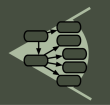





|
|


|
|
||
 |
|
|
This is version 1.
It is not the current version, and thus it cannot be edited. Session 4: Community-driven development and maintenance Breakout-Group Products * Develop a consensus definition of "observation" Background This session aims at defining mechanisms for building community participation and support for a shared observational data model and corresponding technology development. A community-based effort will help avoid the creation of largely redundant, potentially incompatible technology solutions, and foster interoperability and robustness of the applications that are developed. In addition to discussing how to best achieve a broadly participatory framework to move this effort forward, this session will also consider the needs for training, and support for the products created by a coordinated development effort. Discussion topics What mechanisms should be considered for building community participation and support for an observational data model standard? Similarly, what community-based efforts should be considered for coordinated technology development? Possible issues: * How should the standard observational data model be developed and maintained? * What are possible organization models for developing, maintaining, and encouraging adoption of a shared model? * How broad should the model be, e.g., what scientific communities should be targeted? * What lessons can be learned from other communities (e.g., the GO Consortium, UMLS, other standardization efforts) * What protocols should be used to make changes or adopt extensions to the model? How will changes be reviewed? How will conflicts among communities be resolved? How will extension models be validated? * What tools should be developed or endorsed to facilitate the creation, maintenance, and use of ontologies? * How should training be addressed? * What are the staffing issues and levels needed for creation, maintenance, and curation of a community-based and shared observational data model and associated applications? Session notes and results
|
| This material is based upon work supported by the National Science Foundation under award 0619060. Any opinions, findings and conclusions or recomendations expressed in this material are those of the author(s) and do not necessarily reflect the views of the National Science Foundation (NSF). Copyright 2007 |